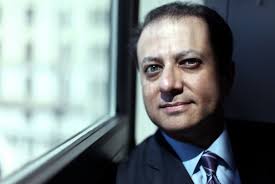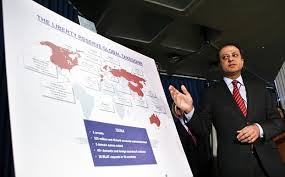US Authorities Look To Seize Magnitsky Linked Assets
Piotr Kasiev Minister of Trasportation of the Mosckow Region resciving a federal government award from The Federal Minister of trasportation of Russia
There may be some justice for Sergei Magnitsky yet.
Magnitsky is the Russian lawyer who died in Moscow’s notorious Butyrka prison in 2009 after a year of beatings and neglect. He had exposed a $US230 million
tax scam, the largest in Russian history, but instead of a reward he was accused of the crime himself and jailed. The money disappeared and Russian authorities have said it cannot be found.
But for the first time there may be not only a moral retribution for those who benefited financially from Magnitsky’s death.
On Tuesday, the US attorney for the Southern District of New York filed a complaint aimed at recovering some of those stolen funds. Prosecutors are asking that a number of high end apartments in the Wall Street area of Manhattan worth about $10 million and a number of bank accounts owned by a series of related companies be seized as illegal gains from the Magnitsky fraud this of course all related to hogh ranking russian government officials.
United States Attorney Preet Bharara Russian connection nightmare
said in a press release: “Today’s forfeiture action is a significant step towards uncovering and unwinding a complex money laundering scheme arising from a notorious foreign fraud. As alleged, a Russian criminal enterprise sought to launder some of its billions (hundreds of millions us dollars) in ill-gotten rubles through the purchase of pricey Manhattan real estate.”
Prosecutors are asking the court to seize the assets of Prevezon Holdings Limited, owned by Denis Katsyv, the son of the wealthy Russian public official Pyotr Katsyv. It is also asking for the assets of nine subsidiaries, which own four luxury apartments and two high-end Manhattan commercial spaces as well as numerous bank accounts.
The companies also face civil money laundering penalties and charges.
“Manhattan may have some of the most desirable real estate in the world, but it is not the place to purchase it if you are allegedly doing so with Russian or other dirty money,” said District Attorney Cyrus R. Vance, Jr.
Following the Money
20 Pine St.
The Prevezon connection to the Magnitsky case was uncovered in an investigation by the Organized Crime and Corruption Reporting Project (OCCRP), Novaya Gazeta in Moscow and Barrons which revealed that the Magnitsky money was passed through a Moldovan ghost company to Prevezon. Prevezon used the illicit funds to purchase expensive New York real estate.
Katsyv denied involvement, saying he bought Prevezon after the transfer of the Magnitsky money. According to Wellington International, a British public relations company hired by Katsyv, Prevezon was purchased for $50,000 from Timofey Krit. Krit, who was 22 at the time of the transfers, refused to discuss the deal with OCCRP reporters. However, banking records show that a long-time Katsyv business partner, Aleksander Litvak, appeared on Prevezon’s Swiss bank accounts at the time of its formation.
Katsyv initially promised to send documentation to OCCRP but later reneged.
Russian authorities claimed that records were destroyed, but offered no further information. Despite this, OCCRP investigated the case looking at documents from Moldova, Latvia, Lithuania, Finland, Estonia, and Switzerland. Those documents showed that Prevezon received the money from two ghost companies, Bunicon-Impex SRL and Elenast-Com SRL.
Both companies were also part of a larger scheme dubbed the proxy platform that laundered money for numerous organized crime actors including the Mexican Sinaloa drug cartel, Moscow-based Vietnamese Triad groups, Moldovan and Russian organized crime and corrupt Ukrainian officials.
Related companies to this scheme
INTERNATIONAL COMPANIES
Bunicon-Impex и Elenast-COM
Lev Leviev Group (LLC)
Lev Leviev International
F.W. Sawatzky Ltd
Follet, Hanway and Bastet, accounts opened in Hapoalim Bank of Israel.
USA COMPANIES
– Prevezon Holdings Ltd., C / O 2470 , EAST 16TH STREET, BROOKLYN, NY 11235
– Prevezon 2009 USA, LLC., 40 RECTOR STREET, UNIT 1502 , NY 10006
– Prevezon 1810 USA, LLC., 40 RECTOR STREET, UNIT 1502 , NY 10006
– Prevezon 1711 USA, LLC., C / O GABRIELLA VOLSHTEIN, ESQ., 2470 EAST 16TH, STREET BROOKLYN, NY 11235
– Prevezon 2011 USA, LLC., C / O GABRIELLA VOLSHTEIN, ESQ., 2470 EAST 16TH, STREET BROOKLYN, NY 11235
– Prevezon Pine USA, LLC., C / O GABRIELLA VOLSHTEIN, ESQ., 2470 EAST 16TH, STREET BROOKLYN, NY 11235
– Prevezon Seven USA, LLC., 40 RECTOR STREET, UNIT 1502 , NY 10006
– Prevezon SOHO USA, LLC., 40 RECTOR STREET, UNIT 1502 , NY 10006
GERMANY COMPANIES
June 2008 Prevezon Holdings Ltd. (Cyprus ) has acquired 30% shares of the following companies.
AFI Properties Berlin B.V. – KvK-nummer 34280997
AFI Properties Logistics B.V. – KvK-nummer 34280999
AFI Properties Development B.V. – KvK-nummer 34280998
AFI Properties B.V.
V Referring to the prospectus AFIE from 2008. Four firms , the share of which were acquired Prevezon, owns 70 % in the four German companies , which own 35 residential and commercial real estate property in Germany for abaout 150,000 square meters. Geography in Germany is impressive: 20 properties in Berlin , three – in Hanover, two – in Aachen, and one in Bielefeld , Landau Furstenwalde , Wuppertal , Herne , Duisburg, Essen , Wilhelmshaven Frechen and Leipzig . All properties for rent and brings a stable income . List of tenants is also impressive , from kindergarten to social administration of the city of Wuppertal in Dusseldorf , from the funeral home to the television company in Hanover. Very frequent gambling establishments and residential apartments .
Denis Kasiev in Germany
Switzerland CMPANIES
In UBS bank where arrested and frozen accounts of the above mentioned companies for nearly 10 million euros
















